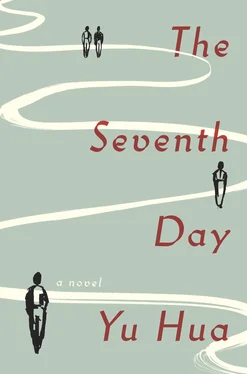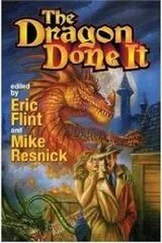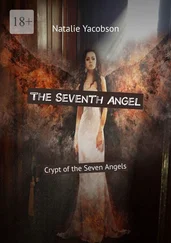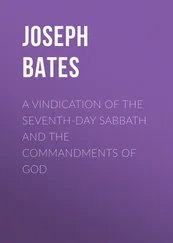The right side of the waiting room was taken up by rows of plastic chairs bolted to the floor, while on the left side was an armchair zone with chairs arranged in several rings and with plastic flowers laid out on the coffee table in the center of each circle. On the plastic chairs many people were waiting, but there were only five seated in the armchairs. Those in the armchairs sat comfortably, with a foot resting on the opposite knee, looking very pleased with their accomplish  ments, while everyone in the rows of plastic seats sat stiffly and properly.
ments, while everyone in the rows of plastic seats sat stiffly and properly.
As I entered, a man wearing a faded blue jacket and a pair of old gloves walked toward me. He was so thin that his bones were like sticks and his face seemed little more than a skull, for it had hardly any skin and flesh.
Seeing my face with its altered features, he greeted me softly. “Good morning, sir.”
“Is this the crematorium?” I asked.
“It’s not called the crematorium anymore,” he said. “It’s called the funeral parlor.”
I realized I’d said the wrong thing, a bit like entering a hotel and asking, “Is this the hostel?”
In his voice I detected a weary, jaded tone, and I could tell he was not the person who had called from the funeral parlor earlier. I apologized for my tardiness, but he shook his head gently and consoled me by informing me that late arrivals were not unusual. My reservation number had expired and was no longer valid, so he walked over to the number-dispensing machine at the entrance to pick up a new ticket for me.
I had been pushed back from A3 to A64; according to the ticket, I had fifty-four people ahead of me.
“Will you be able to fit me in today?” I asked.
“There are always some no-shows,” the usher replied.
With a gloved finger he pointed at the plastic chairs to indicate that was where I should wait. Noticing that my eyes were drawn to the armchairs, he explained that they belonged to the VIP zone, and my status qualified me only for a place in the basic seating. As I made my way, ticket in hand, over to the plastic chairs, I heard him muttering to himself, “Another poor guy who’s come here without a face-lift.”
I sat down on a plastic chair. The usher paced back and forth in the pathway that separated the two waiting areas, seemingly lost in thought, his shoes tapping on the floor with the same steady rhythm as that of someone knocking on a door. Late arrivals kept showing up, and he would greet them and hand them a reservation ticket and point a finger in the direction of the plastic chairs. One of the late arrivals was an elite guest, and the usher walked him over to the armchair zone.
The crematees on the plastic chairs talked in low voices among themselves, while the six in the VIP area also chatted, but loudly, like singers projecting lyrics onstage. Our conversations were more like an accompaniment from the orchestra pit.
Funerary clothes and cinerary urns were the central topics of discussion among the VIPs. They were wearing exquisite handmade silk cerements with bright hand-embroidered designs, and they were discussing casually the price of these garments — all of which cost over twenty thousand yuan. The costumes looked splendid to me, like outfits worn in an imperial palace. Then the VIPs switched their attention to their respective cinerary urns, which were made of large-leaf red sandalwood engraved with exquisite designs and priced in the sixty-thousand-yuan range. The urns’ names were equally splendid and imposing: Sandalwood Precincts, Immortal Crane Manor, Dragon Palace, Phoenix Castle, Unicorn Palace, and Sandalwood Mansion.
We commoners were discussing the same topics. In our case the funerary garments were of synthetic silk with cotton trim, and they cost about a thousand yuan. The cinerary urns were either cypress or wood composite, undecorated, the most expensive costing eight hundred yuan, the cheapest two hundred. The names for these urns took simpler forms, such as Falling Leaves Return to Their Roots, or Fragrance Lingering for Time Everlasting.
Whereas the VIP section was focused on the relative expense of the crematees’ garments and urns, among the plastic chairs the focus was more on who got the best value for the money. Two crematees sitting in front of me found that they had bought identical sets of burial clothes at the same shop, but one had paid fifty yuan less than the other. The one who’d been charged more heaved a sigh. “My wife is hopeless at bargaining,” he muttered to himself.
I noticed that the other crematees in the plastic seats were all wearing funeral garments, either traditional cerements in Ming-Qing style or contemporary designs in Mao-jacket idiom or Western fashion. I was the only one dressed in a pair of Chinese clasp-fastened pajamas, but I was glad that I had at least jettisoned the baggy cotton overcoat — a  lthough my white pajamas were shabby, they could scrape by here among the plastic seats.
lthough my white pajamas were shabby, they could scrape by here among the plastic seats.
But I had no urn, not even a cheap one like Falling Leaves or Fragrance Lingering. This issue began to vex me — just where would my ashes end up? Should they be scattered in the boundless ocean, perhaps? But that was out of the question. That’s the resting place for the ashes of the great, with an airplane to carry them and a navy warship to guard the route, the ashes consigned to the sea amid the tears and sobs of relatives and underlings. My ashes would be tipped out of the oven and greeted with a broom and dustpan, then dumped in a garbage can.
An elderly gentleman on one of the adjacent chairs turned his head and looked at me in surprise. “You haven’t washed or reshaped?”
“I washed,” I said. “I did it myself.”
“But what about your face?” he said. “The left eye has come out and your nose has got out of position and your chin is so long.”
I realized now, to my chagrin, that I had forgotten about my face when washing. “I didn’t reshape,” I said.
“Your family really has been remiss,” the old man said. “They neglected both the wash and the reshape.”
In fact, of course, I was all alone. My adoptive father, Yang Jinbiao, who had raised me from infancy, had left me more than a year earlier when he realized he was terminally ill, and my birth parents were far away in a northern city, not realizing that at this moment I was already in another world.
A woman on the other side, who had been following our conversation all this time, now studied my outfit. “How come your cerements look like pajamas?” she asked.
“What I’m wearing is funerary garments,” I explained.
“Funerary garments?” She didn’t seem to understand.
“Funerary garments are the same things as cerements,” the gentleman said. “ ‘Cerement’ sounds better.”
I noticed that their faces were heavily made up, as though they were about to perform onstage, rather than be cremated.
Someone else in the plastic seats began to complain to the usher. “I’ve been waiting for ages now, but I’ve yet to hear my number called.”
“They’re just in the middle of the farewell ceremony for the mayor,” the usher replied. “They stopped after the first three crematees this morning and we need to wait for the mayor to enter the oven. It won’t be your turn until he comes out.”
“Why do you have to wait for him to be cremated before you do us?” the man continued to wrangle.
“I don’t know the answer to that.”
“How many ovens have you got?” another person waiting asked.
“Two — one import and one domestic-brand. The import is reserved for VIPs — you’ll be using the domestic make.”
Читать дальше

 ments, while everyone in the rows of plastic seats sat stiffly and properly.
ments, while everyone in the rows of plastic seats sat stiffly and properly.









